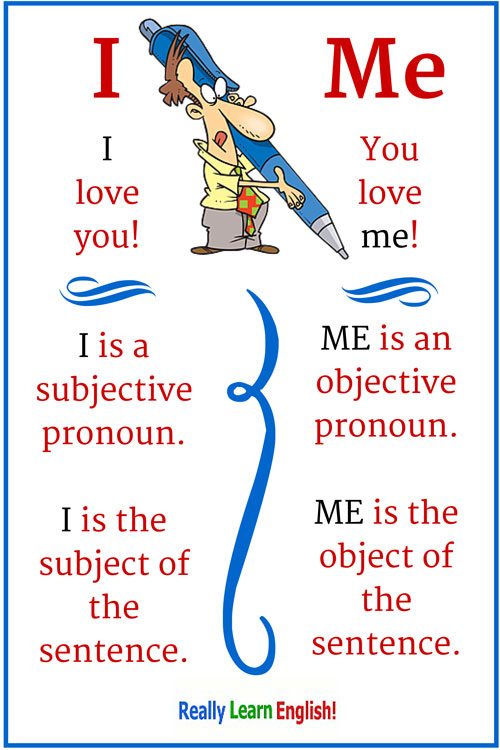You and I vs You and Me
Subjective
and Objective Pronouns
English is full of confusing words and phrases. The phrases "you and I" and "you and me" are confusing for many English learners. Fortunately, there is an easy way to know which one to use. In this lesson, you will learn the differences between the pronouns I and Me. You will also learn how to use them correctly in speaking and writing.
Click Here for Step-by-Step Rules, Stories and Exercises to Practice All English Tenses
Read these two sentences:
You and I should
prepare dinner.
You and me
should prepare dinner.

Which one is correct?
You
and I vs You
and Me is confusing for English learners. Even some native
speakers have difficulties with this!
In this lesson, you will learn the differences between the English pronouns
I and Me. You will also
learn a trick to help you use them correctly in sentences.

English pronouns
You,
Me, and I are all English pronouns.
A pronoun is a word that is used in place of a noun.
There are several different types of pronouns. You, Me, and I are all personal
pronouns because they all represent people.
There are two kinds of personal pronouns in English: subjective and objective.
Subjective
pronouns
Subjective pronouns are pronouns that are used as the subject of a sentence.
I is a subjective
pronoun.
Examples:
- I
play the guitar.
- I can
sing.
- I am
happy.
- I am
a teacher.
- I love English.
Objective
pronouns
Objective pronouns are pronouns that are used as the object of a sentence.
Me
is an objective
pronoun.
Examples:
- Nick called me.
- She gave the book to me.
- The teacher asked me
a question.
- The book belongs to me.
- Give it to me.

The pronoun "you"
The pronoun you can be
a subjective
pronoun or an objective
pronoun.
Examples:
Subjective
- You are smart.
- You have a good teacher.
- You are
my friend.
- You speak good English!

Objective
- I like you.
- Mary needs you.
- She gave the book to you.
- They called you last night.

Let's review:
I is always the subject of a sentence and Me is always the object of a sentence.
- I love
you.
- You love me.
- I
am happy.
- You are happy for me.

Incorrect:
- Me
love you.
- You love I.
- Me
is happy.
- You are happy for I.
So, how do you choose between I and Me in a sentence?
You and I should
prepare dinner.
Or
You and me
should prepare dinner.

Say the sentences without the word you.
Me should prepare dinner.

The first sentence is correct.
I should prepare dinner.
You and I should prepare dinner.
Let’s try another example:
Or
He gave the book to you and me.
Say the sentences without the word you.
He gave the book to me.
The second sentence is correct.
He gave the book to me.
He gave the book to you and me.
In these types of sentences, always place you
before me
or I. It is
respectful to say you
before me or I.
Incorrect:
- He gave the book to me
and you.
- I and you should prepare dinner.
Correct:
- He gave the book to you
and me.
- You and I should prepare dinner.
Get Updates, Special Offers, and English Resources
Download your FREE GIFT (the first two chapters of
English Short Stories Book and Workbook)
as soon as you join!

By submitting your email, you consent to receiving updates and newsletters from us and to the sharing of your personal data with third parties for the purposes of sending you communications. We will not spam you. You can unsubscribe at any time. For more information, please see our privacy policy.
Return from You and I vs You and Me to Confusing Words
Return from You and I vs You and Me to English Pronouns







